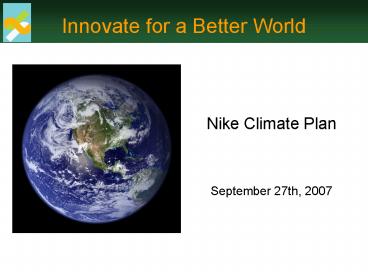Innovate for a Better World - PowerPoint PPT Presentation
1 / 12
Title:
Innovate for a Better World
Description:
LEED certified factory stores makes a statement in each community where a store is based. ... LEED certified retail and offices. USE RENEWABLE ENERGY. Invest in ... – PowerPoint PPT presentation
Number of Views:23
Avg rating:3.0/5.0
Title: Innovate for a Better World
1
Innovate for a Better World
- Nike Climate Plan
- September 27th, 2007
2
Timeline
- 1992 Nike first learns about the global warming
potential of SF6.
- 1997 (September) Nike commits to fully phase SF6
out of footwear and begins to transition some
models to Nitrogen
- 2001 (October) Nike joins WWF Climate Savers.
Sets CO2 emissions reduction targets for owned
operations and business travel.
2005 Nike exceeds WWF target of 13 reduction -
reaches 18 CO2 reduction
N I K E
- 2003 Nike develops a baseline of inbound
logistics and subcontracted manufacturing
2006 (June) Nike completes phase out of all f
gases in Nike branded footwear
2007 (May) Nike sets new targets
1997 (December) Kyoto Protocol adopted.
2007 (Feb) IPCC 4th assessment
2001 (September) The IPCC releases its Third
Assessment. Reaffirms warming trend and human
impact
1988 The World Meteorological Organization and
the United Nations Environment Program establish
IPCC
G L O B A L
1995 The IPCCs Second Climate Assessment is
published,serving as the basis for Kyoto Protocol.
2005 (February) The Kyoto Protocol begins. The
United States, refuses to ratify
3
2001 MOU with WWF
- WHERE WE WORK
- MOVING PEOPLE
- Reduce carbon dioxide (CO2) emissions13 below
1998 levels by 2005. - Includes
- CO2 from Nike-owned facilities and business
travel - Conserving energy, buying green power, and
investing in community energy-efficiency projects - MAKING PRODUCT
- MOVING PRODUCT
- Supply Chain CO2 baseline2003
- Footwear and Apparel contracted manufacturing
- Logistics
- Remove GHG from Products (pre-existing commitment)
4
Achieved Goal
COMMITMENT Reduce carbon dioxide (CO2) emissions
13 below 1998 levels by 2005.
5
SF6 Elimination from Product
- Began RD in 1995, Completed phase out in 2005
- Measured and verified by ERT
6
Our Climate Goals
WHERE WE WORK Nike Brand Climate Neutral
Facilities by 2011 Nike, Inc. Climate Neutral
Facilities by 2015
MOVING PEOPLE Climate Neutral Business Travel by
2011
WHERE WE WORK
MOVING PEOPLE
(2005)
(2005)
Tier 1
MAKING PRODUCT (Footwear contracted
manufacturing) Reduction Target TBA
MOVING PRODUCT (Logistics to first point of
distribution) 30 Absolute Reduction in CO2
footprint from 2003 Baseline by 2020
Tier 2
MAKING PRODUCT (Equipment contracted
manufacturing)
MAKING PRODUCT Apparel contracted manufacturing
MAKING PRODUCT (Apparel contracted manufacturing)
Nike Footprint 1.36 m metric tons
(2003 baseline)
7
Climate Counts
8
Moving People
HIGH Brand
- Challenges
- Global growth and matrix structure makes
meaningful communication and relationship
building necessary. - On-site commercialization encourages developers
and designers travel to factories. - Opportunity
- Rapidly increasing SGA make travel reduction a
financial priority.
HIGH ROI
HIGH Control
- REDUCE
- Invest in IT Make virtual communication a
viable alternative to travel - Build awareness of travel proliferation and
environmental consequences
USE RENEWABLE ENERGY N/A
MOVING PEOPLE Nike Brand Climate Neutral Business
Travel by 2011 Nike, Inc. Climate Neutral
Business Travel by 2015
OFFSET Buy offsets for each flight
9
Where We Work
- Nike energy consumption has not increased since
1998 despite a 25 increase in square footage.
(USA) - 2 absolute decrease with 6 growth in
facilities. (Global) - Green power and tags grew from 1 in 2002 to
52 in 2007.
Nike, Inc. rated a top commuter workplace by EPA
Global HQ building awarded Oregons first LEED EB
Gold
Europe HQ runs on 100 renewable energy
EMEA Dist. Center uses 6 windmills for all of its
energy
Global HQ purchases renewable energy credits for
100 of energy used
10
Where we work Facilities and Retail
- Challenges
- Rapid growth of factory stores.
- Many small NLOs dispersed around the world.
- Engage affiliates.
- Opportunity
- LEED certified factory stores makes a statement
in each community where a store is based. - Global presence lets us advocate for renewable
and green design globally.
HIGH Brand
HIGH ROI
HIGH Control
- REDUCE
- Energy Efficiency upgrades
- LEED certified retail and offices
- USE RENEWABLE ENERGY
- Invest in Wind and Solar
- Regional opportunities to buy green power
directly from utility
- WHERE WE WORK
- Nike Brand Facilities are Climate Neutral by 2011
- Nike, Inc. Facilities are Climate Neutral by 2015
- OFFSET
- Renewable Energy Credits (RECs) offset of CO2
footprint
11
Moving Product
HIGH Brand
- Challenges
- Shrinking lead times and customer requirements
make airfreight attractive. - Factories are located far from retail.
- Fuel prices going UP
- Constrained fuel availability in the future
Peak Oil scenario - Taxation and regulation on the increase
- Opportunity
- Reducing airfreight aligns financial and CO2
objectives ROI2
LOW Control
- REDUCE
- Airfreight discipline
- Partner with logistics providers
- Baseline our Outbound logistics footprint
- Packaging redesign project
- USE RENEWABLE ENERGY
- Partners utilizing alternative fuels (i.e.
biodiesel)
- MOVING PRODUCT
- 30 Absolute Reduction in CO2 footprint from 2003
Baseline by 2020
OFFSET With regions, develop an offset strategy
12
Making Product
HIGH Brand
- Challenges
- Heavy reliance on Coal in developing countries,
especially China. - NIKE has indirect influence over energy reduction
projects. - Financial returns are indirect.
- Understanding of the complexity of embedded
energy - Opportunity
- Suspect that current operations are inefficient.
Lots of low-hanging fruit - Global presence lets us advocate for renewable
energy and energy efficiency globally. - Greater understanding of carbon impact of raw
materials
LOW ROI
LOW Control
- REDUCE
- Baseline energy use in footwear factories
- Leverage WHQ expertise in energy efficiency
projects
- USE RENEWABLE ENERGY
- Research local options
- MAKING PRODUCT
- Footwear Reduction Target TBA
OFFSET































